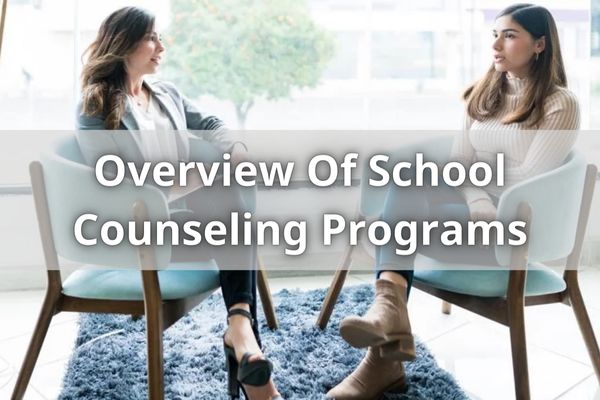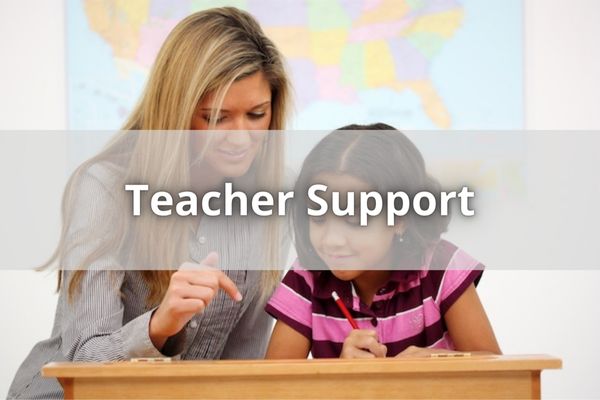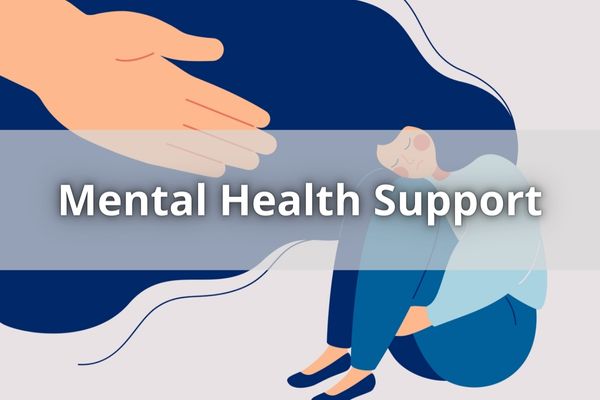Best School Counseling Programs: Counseling Degree Programs
As a parent, I want to make sure my children get the best education and counseling services they can. School counseling programs play an essential role in providing students with the resources they need to be successful academateurs.
In this article, I’ll discuss the elements of some of the best school counseling programs that are making a real impact in our schools today. I’ll cover topics such as developing an effective program, individualized counseling services, social-emotional learning, teacher support, college and career readiness, mental health support, crisis intervention and data-driven decision making.
All these components are important for creating a comprehensive school counseling program that meets students’ needs.
Overview Of School Counseling Programs

You may be wondering what school counseling programs are all about – let’s take a closer look!
A school counseling program is made to provide counselors with the abilities and information required to help students and advance their intellectual, social, emotional, and behavioral growth. In addition to state licensure as a school counselor, school counselors often hold a Master of Arts in School Counseling or a Master of Education in School Counseling.
To design a setting that will support student learning, these experts work with administrators, parents, and teachers. They provide counseling services such as individual and group sessions, assessment tools, crisis intervention strategies, classroom guidance activities, and more. The goal is for the school counselor to help develop each student’s abilities so they can reach their highest potential.
Schools also offer other related educational programs that work together with the school counseling program, such as career exploration initiatives or college admissions workshops. These programs often operate under the supervision of a licensed school counselor but are carried out by other faculty members or volunteers within the community who have specialized knowledge pertaining to these topics.
Working together with these initiatives allows schools to provide comprehensive resources for students in order for them to succeed beyond high school into adulthood.
Moving forward, we’ll explore how schools can develop an effective school counseling program.
Developing An Effective School Counseling Degree Program
Gaining a comprehensive understanding of what makes an effective school counseling program is essential for creating one that meets the unique needs of your students.
An important first step in developing an effective school counseling program is obtaining a degree in school counseling or related degree program, such as earning a master’s in school counseling program. This will equip you with the necessary knowledge to understand how to implement and manage group and individual counseling services.
It’s also crucial to take into account the many resources accessible for offering specialized counseling services, such as mental health specialists, peer mentors, and other support staff.
Examining recent data on student performance is crucial in order to spot areas where further help could be required, possibly in the shape of brand-new programs or initiatives. By taking the time to evaluate existing data sets and assess current trends among students, you can create targeted interventions that are tailored specifically to meet their needs.
Finally, be sure to invest time into building positive relationships with staff members, teachers, administrators, and parents as these connections are critical for ensuring successful outcomes.
Individualized Counseling Services
Offering personalized counseling services can help ensure that each student’s unique needs are met. Knowing the right counseling skills and techniques is essential for providing tailored support to each student.
A graduate degree in psychology or counseling can provide the necessary skill set for implementing an individualized program. Counselors must also be aware of potential obstacles when devising a plan for each student, as this approach program requires significant effort from both parties involved.
With proper training and expertise, school counselors can create a program that properly takes into account all aspects of their students’ mental health and wellbeing. This allows them to develop interventions that are more effective than generalized approaches to counseling services.
Transitioning into social-emotional learning, these tailored programs need to focus on further developing the emotional intelligence of students so they can better understand themselves and others around them.
Social-Emotional Learning
You may understand yourself and the people around you better by developing your emotional intelligence. The finest school counseling programs incorporate social-emotional learning (SEL) because it gives children the tools they need to succeed in life.
Students gain skills in emotional management, goal-setting, decision-making, and the development of healthy relationships through SEL. Mental health counseling, group and family counseling sessions, ethical guidelines for school counselors regarding student confidentiality and safety—all of these are integral parts of a comprehensive social-emotional learning program.
All students’ needs should be considered during the planning and execution of school counseling programs so that everyone can eventually gain from these services. With this in mind, SEL may be utilized to assist instructors in establishing a secure learning environment where children can grow both emotionally and academically.
Teacher Support

Providing teachers with the resources and support they need to foster a safe learning environment can empower students to develop emotionally and academically. As such, school counselors must be equipped with the necessary qualifications to recommend counseling licensure, school counseling degree programs, school counselor certification, and administration of school counseling programs.
To aid teachers in this endeavor, they should have access to:
- Professional development opportunities
- Mentoring programs
- Accessible mental health resources
- Collaboration tools
These will help ensure that teachers are supported enough to create an inviting classroom setting for their students and promote healthy social-emotional growth in each student.
Ultimately, teacher support is essential for successful school counseling programs and should not be overlooked when developing strategies for student success. By collaborating with both schools and communities, even greater strides can be made toward creating a better educational experience for all involved.
School And Community Collaboration
To establish a fruitful educational opportunity that will benefit all parties involved, you can collaborate with neighborhood communities. Collaboration with educational institutions and neighborhood groups provides the chance to expand upon current resources and discover new ones.
By working together, school counseling programs can meet Council for Accreditation of Counseling and Educational Counseling standards in order to support students within a school setting. This collaboration is especially important in secondary schools where multicultural counseling becomes even more critical in helping students excel academically.
Counselors may make sure that all children have access to the tools they need to flourish in a secure and encouraging environment by fostering relationships between schools and the community around them. With this as a foundation, parent and family engagement will further strengthen the bond between home, school, and community.
Parent And Family Engagement
By engaging parents and families, you can create a more unified environment that allows students to thrive academically and emotionally. This can be accomplished through offering family counseling sessions, accreditation of counseling and related educational programs, and online master’s degrees in School Counseling or Masters in Science in Counseling.
The school counselor may create a successful action plan by better understanding the student’s unique needs at home and at school with the use of these services.
Parental participation also enables a deeper comprehension of the student’s interests and professional objectives, which is crucial for college and job preparedness.
College And Career Readiness
Transitioning from parent and family engagement to college and career readiness, I believe that school counselors play a crucial role in helping students achieve success.
School counseling programs should focus on providing education about post-graduate opportunities so that high schoolers have the opportunity to learn more about what their futures can hold.
It’s important for public schools to partner with the Association of Colleges and Schools as well as other organizations such as those who offer Master of Science in School Counseling degrees in order to provide comprehensive career counseling resources. Having this information readily available will help prepare students for their future paths, whether it be college or another form of post-secondary education.
In addition, school counselors can also help mentor students on how they can use their experiences at school to build a solid foundation for the next steps in life. This could include advice on how certain classes may be beneficial or which extracurricular activities could be advantageous when applying for college or jobs.
By having conversations like these, it shows students the importance of planning ahead and being proactive about their goals. With this knowledge, I’m confident that we can equip our youth with the tools necessary to excel beyond high school!
Moving forward, mental health support systems must also be established in order to ensure holistic student growth.
Mental Health Support

Having a strong mental health support system in place is essential for students to reach their fullest potential and make meaningful progress. This includes having certified and licensed school counselors who are knowledgeable in the field of psychology and counseling.
A degree from an approved university is required for accreditation as a school counselor, but some states also call for license or certification before employment. The Psychology and Counseling Accreditation Council (PCAC) sets standards for certification and licensure, which helps ensure quality mental health care within schools.
Clinical mental health counseling teaches students how to manage their emotions, develop resilience, and look for answers to any problems they could encounter while pursuing their education. By offering this degree of assistance, it may be possible to lessen the stigma associated with seeking mental health services and inspire more students to do so when necessary.
Schools may foster an atmosphere where children feel comfortable discussing their mental health concerns without worrying about being judged if the proper services are put in place. From here, we move into crisis intervention…
Crisis Intervention
You can take control of your mental health journey by seeking out crisis intervention services. Reach out and get the help you need to overcome any obstacles in your way.
School counseling programs provide a variety of counseling theories and techniques to assist students through difficult moments. Theory-based interventions such as cognitive-behavioral therapy, brief solution focused therapy, mindfulness practices, and person-centered interventions are used in individual counseling sessions.
Group counseling provides an opportunity for students to build relationships with their peers while engaging in therapeutic topics that promote personal growth and development.
Counseling practice is also enhanced with data-driven decision making based on assessments that inform best practices for student well-being.
School counselors use crisis intervention strategies to address emergency situations quickly and effectively. With a masters in school counseling, practitioners are trained to apply evidence-based prevention strategies that reduce the risk of serious incidents from occurring.
By intervening early on, school counselors can be proactive when it comes to creating safe learning environments for all students.
Data-Driven Decision Making

After talking about crisis management, let’s explore data-driven decision making. This is a crucial tool for school counselors because it enables them to base choices on facts rather than feelings or speculation.
School counselors can use a set of standards and directives created by the American School Counselor Association (ASCA) to create their own data-driven decision making procedures. School guidance programs should offer data-driven solutions and provide access to a variety of resources such as the ASCA standards so that counselors can make informed decisions about their students’ lives.
By integrating science into education in school counseling program, counselors can better understand how to use data ethically and effectively while also providing quality services for students. Those wishing to pursue a master’s in school counseling degree will need to demonstrate proficiency in both crisis intervention and data-driven decision making techniques.
Conclusion
After researching the best school counseling programs, I can see that they all have one thing in common: providing a safe and supportive environment for students. Through individualized counseling services, social-emotional learning activities, teacher support and more, these programs are helping to promote college and career readiness as well as mental health support.
Additionally, crisis intervention is often necessary when unexpected events arise. By staying up-to-date with data-driven decision making, school counselors can better serve their students and help them reach their fullest potential.
Overall, effective school counseling programs are essential to creating successful outcomes for our youth.







